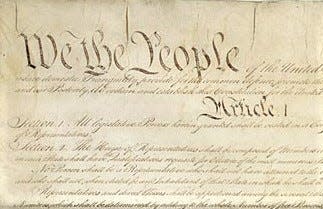Why was the Ninth Amendment to the Constitution necessary? Here's why. | Opinion
Editor's note: This is a regular feature on issues related to the Constitution and civics written by Paul G. Summers, retired judge and state attorney general.
The U.S. Constitution is our supreme law in America. Amendments are part of the Constitution. The first 10 Amendments, or Bill of Rights, were submitted to the state legislatures in 1789 and ratified in 1791. Amendment IX was one of the Bill of Rights. Much scholarly discussion has surrounded the Ninth Amendment. The question has presented itself: “Was the Amendment necessary?”
Amendment IX: “The enumeration in the Constitution, of certain rights, shall not be construed to deny or disparage others retained by the people.”
Some lawyers, judges, and legal academics argue that the Ninth Amendment provided a protection for rights not specifically mentioned in the Constitution. If the Anti-Federalists, who promoted a Bill of Rights, did not mention a fundamental right retained by the people, then that right was included. Some others argue that “if fundamental rights are retained and have not been surrendered,” then the Ninth Amendment was unnecessary.
Regardless, the Ninth Amendment is a means for the Court to determine certain rights which predate the Constitution. Even if never mentioned in the Constitution, they are not excluded. For example, the right of privacy in many settings would be a fundamental right recognized, but not enumerated, in our Constitution.
Hear more Tennessee Voices: Get the weekly opinion newsletter for insightful and thought provoking columns.
The Ninth Amendment emerged from a compromise
We remember from our history that there was no Bill of Rights in the original Constitution. The Anti-Federalists generally opposed this “new” Constitution because it gave too much power to the federal government.

They demanded that individual freedoms and rights be spelled out in what is now known as the Bill of Rights. The Federalists agreed to a bill, to obtain the support of the Anti-Federalists, who supported a more decentralized government.
They generally lived at a distance from the central power of our new government. They did not trust the power of the federal government and would today be considered states’ rights activists.
The Bill of Rights was ratified about two years after the original Constitution to assuage the drafters who believed in decentralized government. It is interesting that in the 18th Century, politicians could still craft agreements with a handshake and a promise. Apparently their word was their bond.
Why can we not do that today, in the 21st Century? We should always, in a country of freedom of speech, religion and petition, be able to do that which we did in 1789.
Sign up for Latino Tennessee Voices newsletter:Read compelling stories for and with the Latino community in Tennessee.
Sign up for Black Tennessee Voices newsletter:Read compelling columns by Black writers from across Tennessee.
Benjamin Franklin was right
Our Constitution has survived for 234 years.
Benjamin Franklin was asked what kind of government the “new” Constitution provided. His answer was, or words to that effect: “A republic, if you can keep it.”
Doctor Franklin was correct.
We shall continue our study of the Constitution in the next article about Amendment X. Reading and studying the Constitution are times well spent.
Paul G. Summers is a lawyer. He is a former appellate and senior judge, district attorney general, and the Attorney General of Tennessee. Raised in Fayette County, Judge Summers resides in Holladay and Nashville.
This article originally appeared on Nashville Tennessean: Civics: Why the Ninth Amendment was included in the U.S. Constitution
